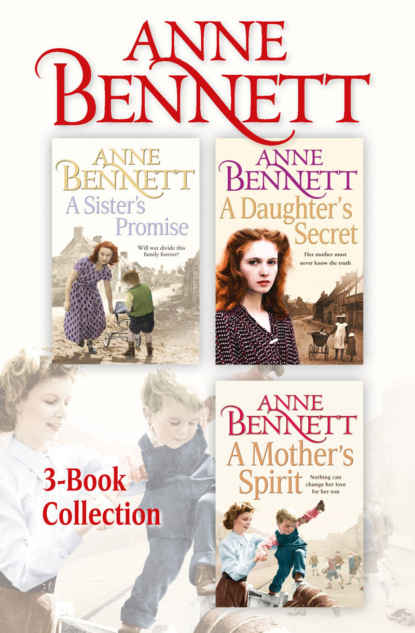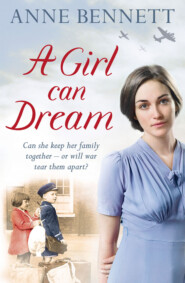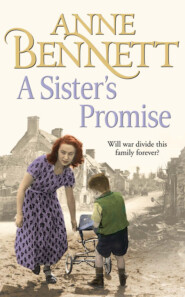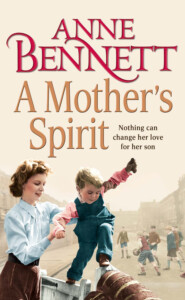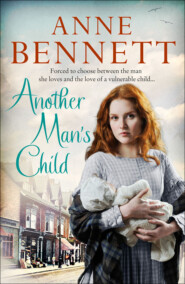По всем вопросам обращайтесь на: info@litportal.ru
(©) 2003-2025.
✖
Anne Bennett 3-Book Collection: A Sister’s Promise, A Daughter’s Secret, A Mother’s Spirit
Настройки чтения
Размер шрифта
Высота строк
Поля
The next afternoon, on the way to the McEvoys’, Tom admitted to Molly that he didn’t think he would ever have spoken to his mother the way he had done if he hadn’t been drinking.
‘Maybe you should have taken to the drink years ago then,’ Molly told him.
‘I hate unpleasantness,’ Tom said.
‘Not when you’re drunk you don’t,’ Molly said. ‘You fair went for your mother yesterday and at least she put up little objection to me coming here today.’
‘Well, that is because she is barely talking to either of us.’
‘Personally, I prefer it that way,’ Molly said with feeling. ‘And you really don’t have to walk all the way with me, unless you want to, especially as you are coming back to fetch me later. After all, it’s broad daylight and I know the way.’
‘Even on a day as overcast as this one, it is far preferable to be out in the fresh air than in with my mother,’ Tom said.
‘Well, I can’t argue with that,’ Molly said, ‘for the look on your mother’s face today would sour cream. And the dogs seem to appreciate the walk,’ she added, indicating Skip and Fly cavorting in front of them. She was getting on well with the two dogs now and she always spoke to them and gave them a stroke when she took them out their food. ‘I bet they are as pleased to get away from the farm as we are.’
‘Man or beast, it is good to have a break, and I am only just beginning to realise that myself,’ Tom said. ‘Now you can go on from here and I will take to the hills with the dogs.’
‘When will you come for me?’
‘Well, I’ll walk over when I have finished the milking and had my tea,’ Tom said. ‘No need for you to be ready then, though, for I’m going for a few jars with Cathy’s father before we set off back home.’
‘Oh, Uncle Tom, your mother will not be best pleased.’
‘Is she about anything now, Molly? Answer me that.’
And she wasn’t, that was the problem, Molly thought as she watched her uncle striding away, whistling to the dogs to follow him. Hilda was right: Biddy was a very unhappy woman. As Molly walked on she tried to imagine what it would be like waking up each morning, knowing that nothing that happened that day or any other day would even satisfy, never mind please. She wasn’t sure she would want to wake up at all.
A few days later, Tom took Molly to the bog to cut the turf and there was an unseasonable chill in the air. The sky was gunmetal grey and heavy black clouds were shrouding the tops of the hills.
‘Could rain,’ Tom commented, looking out at the sky anxiously. ‘But the only spare oilskin we have belonged to Joe, and I’d say that would be a mite big on you.’
Big was an understatement, for it reached Molly’s feet, and even with the bottom cut off and the sleeves cut down, it was still ridiculously large. But as Tom said, few would be seeing what she looked like and it was better than nothing at all.
There were a fair few other farmers at the bog that day, as Molly could see from a distance. Some had lads with them, though Molly estimated that the boys were slightly older than she was. As they drew closer, she saw that most of them had their trousers rolled up and were barefoot. ‘I used to go barefoot too throughout the whole summer,’ Tom told her, seeing her watching this. ‘We all did. In fact I used to hate to be forced into boots again to begin school in September, though I was glad enough of them when the snow and frosts were about. I thought you wouldn’t like to go barefoot, though, not being brought up to it.’
‘You’re right,’ Molly said. ‘I wasn’t brought up that way and neither was Kevin, and that was because my father was in work, but there were plenty in Birmingham not so lucky. I saw many thin, undernourished and barefoot children there, and that was the same summer and winter.’
‘It is a terrible thing all right for a man to have no job.’
‘That was what my father often said,’ Molly said. ‘The point is, he might have been in the same boat if it hadn’t been for what happened in the war.’ She related the story of the rescue of Paul Simmons and what happened because of it, when the war was ended.
Tom was impressed, Molly could see, and when he said, ‘I would say that you had a hero of a father,’ she nodded happily.
‘I know,’ she said. ‘And he was lovely as well, but when I said that to Mom she always said all the men who fought in the war that they call “the Great War” were heroes, and some never came back from it. I mean, some of the families are so poor because they have no provider at all and some of those who did come back, were so badly injured they were totally unable to work.’
‘You still miss your parents a great deal, don’t you?’ Tom said gently.
Molly nodded. ‘It’s like a nagging pain that is always there, but it helps to talk about them sometimes and remember how things used to be, and it is nice to hear things about my mother as a girl and everything. Was she ever taken to the bog?’
‘No,’ Tom said, smiling at the notion as he pulled the horse to a halt. ‘Few girls, particularly those of your age now, are taken to cut the peat, in actual fact,’ he said. ‘And, God above, if I had ever suggested taking Nuala, my mother would have beaten the head off me.’
Molly laughed at that image, and at the sound the other farmers noticed their arrival and greeted them. Tom smiled as he saw that many of the boys were more than interested in Molly, and he couldn’t blame them, for while most people would have looked ridiculous in the oversized clothes, Molly looked very fetching indeed. Tom thought her beauty was such that if she had been clothed in a sack she would still look good. She seemed totally unaware of it herself and oblivious to the boys’ interest in her too, which Tom thought a good thing. She was very young yet.
He leaped from the cart and helped Molly down before saying, ‘First the bog is cut into lines. See where the others have started?’
Molly nodded and Tom continued, ‘So if I start marking out the lines could you come after me and do the cutting into the brick shapes you have seen at home?’
‘Yeah,’ Molly said. ‘It doesn’t seem so hard.’
It wasn’t hard, but it was backbreaking, though Molly didn’t find that out straight away. She soon realised why the terrain was called a bog. Because no rain had actually fallen for some time, the thin grass covering the bog was dry but as soon as she sliced through the earth with her spade she saw and smelled the black slurry seeping through it. The bog seemed not to wish to relinquish its sod either, and tried to suck it back into the earth, but Molly persevered and eventually withdrew the brick almost triumphantly, threw it into the cart and bent to cut another.
She thought she was working incredibly slowly and ponderously, but when Tom, thinking he had drawn enough lines for the time being, came to join her, he said she was doing just fine. ‘There is a knack to it, as there is to most things,’ he said. ‘You will pick it up eventually, but considering this is your first time, you’re not bad at all.’
They went on hour after hour, until the ache in Molly’s back became unbearable and she stretched with a grimace of pain that Tom noticed. He decided enough was enough for now. ‘How d’you fancy a breather?’
Molly barely kept the relief out of her voice as with a shrug she said, ‘If you like.’
They sat a little way away from the bog on Tom’s waterproof spread on the earth. They ate the bread and cheese that Molly had put up before they left, and they washed it down with cold tea, which revived them both. Molly sat back thankfully and surveyed the cart a little way from them.
‘Isn’t that turf too wet to burn?’ she asked.
‘Aye,’ Tom said. ‘It is surely at the moment. We’ll take it back to the barn and stand the bricks up like little houses leaning against one another till the water has drained out of them and they can be stacked and then we will come back for more.’
‘How often do you come?’
‘Until I judge I have enough to last us the winter,’ Tom said, withdrawing his pipe from his pocket. ‘Now I am away for a wee smoke and a jaw with the neighbours. You can either come with me, or stop and rest yourself.’
Molly looked across at the now quite sizeable knot of men and boys, because more had come as they had worked, a fair few of them taking their ease as they were, and she felt suddenly shy to be the only girl amongst them.
‘I think I will stop here, Uncle Tom,’ she said. ‘I am quite tired.’
She was thoroughly weary and when Tom left her she lay back on the waterproof, closed her eyes and in a few minutes was fast asleep. Tom, returning later, did not wake her but just carried on working in the bog alone. Molly woke an hour or so afterwards, disorientated first, and then guilty as she saw the sizeable amount of bog Tom had cleared while she had slept. He waved away her apologies and she set back to work with a will.
That was not the last time Molly went to the bog. As one day slid into another, she got more into the routine of the work, both on the farm and in the house, and usually let Biddy’s word wash over her, for the silent treatment didn’t last nearly long enough in Molly’s opinion. Biddy was especially bad on Sundays, and Molly knew that this was because she resented the fact that so many greeted her warmly, both before and after Mass.
Biddy particularly disliked it when Molly and Cathy got together and began chattering about what they would do later that day. Molly went to the McEvoys for Sunday tea every week. Biddy would have liked to have forbidden the girl, but she sensed that if she did, everyone would be against her. Nellie had enthused about Molly, saying that they all loved having her in the house and that she was no trouble at all, and the two girls got on famously. Then there was Tom, insisting she needed time with other young people and the town’s folk agreeing with that, and the priest beaming in approval.
Biddy would have liked to tell them all to go to hell, that she would make any decisions about the girl. She was, after all, in her charge, but she had to live amongst these people afterwards. She didn’t really understand why the townsfolk should seem to like the girl so well, for she had done all that she could to blacken her name. So, she contented herself with making Molly’s life particularly miserable on Sundays, and if Tom was out of the way she was given many a clout that she kept quiet about.
Biddy blamed Molly’s arrival totally for the sea change in Tom, yet in Molly’s opinion he was acting in a more normal way now. He would go for a drink on Saturdays with the other men when they were in the town and then on Sunday evening before bringing Molly home. Molly often wondered why Biddy found this such a problem and why she would go for him as she did. It was hardly what a person could term excessive.
Her own father used to like a drink a couple of times a week and always after the match on Saturday, and her mother had never minded. Biddy, however, seemed to want Tom never to leave the farm, or seek any other company but hers. God, what a prospect!
As for Molly, she lived for the time spent with Cathy. Sometimes, they went out, maybe met up with friends, and other times it was just the two of them either outdoors or indoors. Molly barely minded which way it was, though if pressed she would have had to say that she liked best the company of Cathy on her own.
Molly had had friends in Birmingham, but she had sort of got out of the way of going about with them when her mother had been so ill. She had very little free time, anyway, at that time, as she shouldered much of the housework. But, in this place, where she had never wanted to live, Cathy was her life-saver.
The school holidays beginning made little difference to Molly, except the summer heat made the work more tiring, especially inside the house, for however hot it was, the fire had to be kept on. Sometimes there was so little breeze that opening the door and windows made no difference and she was glad of the light showers that took some of the heat from the days.





